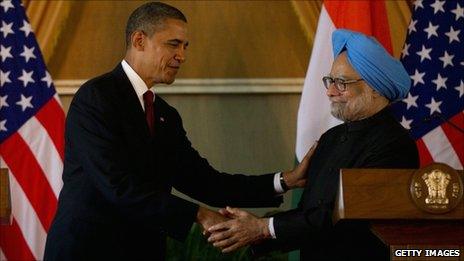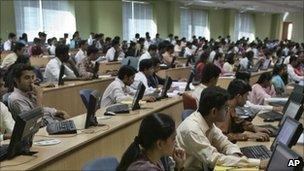US and India put accent on shared values
- Published

Obama's parliament speech, and his visit as a whole, has been well received
Barack Obama's three-day visit to India is his longest to any country since assuming the US presidency.
That, and the fact that he chose India as the first stop of his 10-day Asian tour, is perhaps a measure of how he values the relationship.
And if that was not enough, he took pains to underscore it over several speeches, repeatedly describing the US and India as "the defining partnership of the 21st century".
Once the dust of the presidential visit settles, though, many here will sift through the lofty rhetoric to try to get a sense of how much substance there is to savour.
President Obama arrived here off the back of a massive fall in popular appeal back home and significant mid-term election losses.
His aims were quite clear even before he set off: to seek opportunities for American businesses in emerging economies such as India that could help create jobs back home and help revive the US economy.
It is the reason he picked India's financial capital, Mumbai (Bombay), as his first stop - meeting groups of Indian and American business leaders in closed-door sessions before emerging to announce a slew of deals, valued at $10bn and potentially creating more than 50,000 jobs.
It also led some, perhaps uncharitably, to describe him as President Obama the salesman, rather than the statesman.
Military hardware
But while economics lies at the heart of the relationship between India and the United States, there is a lot more to it.
There is a robust military relationship, for instance. The US and India carry out more joint exercises than they do with any other country.
And India is purchasing military hardware, including surveillance and transport aircraft in a deal worth billions of dollars.
This is the reason why the president, in speeches throughout the day, made references to India's growing international stature and the need for it to play a more influential global role.
During their discussions, President Obama and Indian Prime Minister Manmohan Singh discussed regional issues, not just Afghanistan and Pakistan but also "east Asia", which many took as a reference to China.
That would have pleased many in the Indian administration, because there has always been a feeling that Barack Obama valued his relationship with China a lot more than his with India.
But if there is one thing that Mr Obama will leave behind, it is his strong endorsement of India's bid to become a permanent member of the UN Security Council.
No other American president has so publicly backed India' s UN ambitions, and the fact that it was made in a speech at the Indian parliament was not lost on those listening.
At the same time, it is not quite clear how far Mr Obama is willing to go to back India's bid. UN Security Council reform is a complicated process which could take years.
"At the very least we hope that instructions will go out to US diplomats who are working on Security Council reform to play a more positive role," says Indian MP Shashi Tharoor, a former UN diplomat.

Outsourcing of jobs has been one point of US concern
Mr Obama also tempered his comments with references to India's human rights record and support for regimes such as Iran and, more strongly, Burma.
"With power comes responsibility," he said, adding that standing up for what was right did not amount to interference in a country's internal affairs.
Those comments were met with stony silence in what was otherwise a well-received speech. India has long argued that its regional compulsions (read the geopolitical presence of China) forces it to do business with the Burmese junta.
"Let the US first take as strong a position against Saudi Arabia… other Gulf states and China - none of which are democracies - before telling us what to do," retired Indian diplomat G Parthasarathy said on India's NDTV channel.
But despite the slightly discordant note, Mr Obama's speech, and his visit as a whole, has certainly been well received by his hosts.
There are still plenty of differences: on Pakistan, US Afghan policy and on outsourcing - in the leaders' joint press conference Prime Minister Singh said that India was "not in the business of stealing US jobs".
But many here will concur with the president that there are plenty of shared values between India and the United States for their relationship to endure.
- Published8 November 2010
- Published8 November 2010
- Published5 November 2010
- Published7 November 2010
- Published4 November 2010